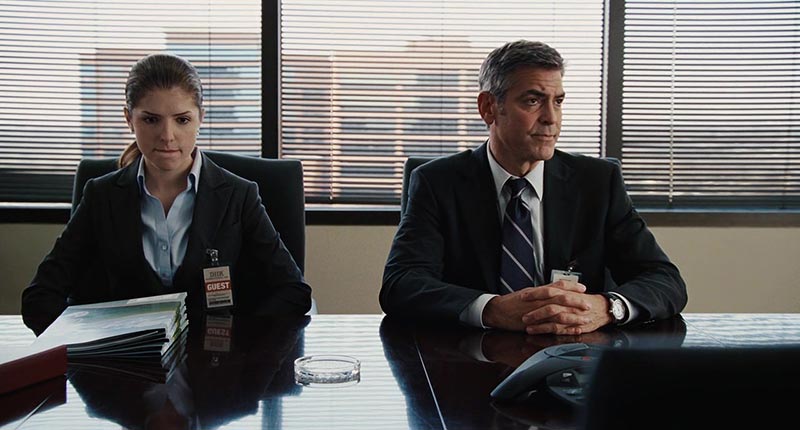This is the second in a series that looks at reviewers who diss the Best Picture Oscar contenders. While Jason Reitman’s Up In The Air, starring George Clooney and Vera Farmiga, has received favourable attention from both the New Yorker and The New York Times, not all reviewers see it as Oscar worthy. The most notable disser is Salon’s Stephanie Zacharek whose relish in bursting the Reitman bubble makes her review an entertaining read. She calls it “opportunistic.” It’s “brushed with a fine glaze of slickness, a product sealed in a blister pack. It’s like airplane air—it has a packaged freshness that isn’t really fresh at all.” Zacharek’s criticism points to the fundamental challenge Reitman faces in creating this film: how do you produce social commentary upon the emptier aspects of American consumer culture without allowing your film to become one more empty product for consumption by that empty culture? The usual answer is that you use satire or parody. But Up In The Air is neither. While it opens with a comedic tone, it aspires to something sincere. It really wants you to know that there are serious life-lessons to be learned here.

Up In The Air is the story of Ryan Bingham, a hatchetman for hire, who travels the country telling employees that they have been let go—or whatever euphemism seems appropriate at the time. On the side, Bingham sells himself as a motivational speaker. He delivers his pat shtick about a backpack, inviting members of his audience to fill their imaginary backpacks with all the stuff in their lives, their possession, obligations, even their relationships. He invites them to feel the weight of the straps as they put on their backpacks and carry their burdens. Then he invites them to empty their backpacks, to travel light. Even relationships can go. He believes that we die if we stop moving. We’re sharks. Bingham has an empty backpack. All he carries in it is a series of casual sexual encounters with a woman named Alex (Vera Fermiga) who lives much as he does (“Think of me as you with a vagina”) and his quest to become the 7th man in history to accumulate 10 million air miles.
However, the women in his life unwittingly orchestrate a slow-dawning epiphany that maybe relationships matter after all. The first is the woman named Alex. When Bingham discovers he might have feelings for her that go beyond sex and play, he takes her to his sister’s wedding. It occurs to him that he might want something more from this relationship. The second is a young business grad named Natalie (Anna Kendrick) whose plan to streamline the firing process threatens Bingham’s lifestyle. Natalie is introducing a program to do the firing online so that men like Bingham no longer need fly from city to city 322 days a year. Bingham takes Natalie under his wing to persuade that her that the personal touch does make a difference after all. The third woman is Bingham’s sister, Julie (Melanie Lynskey), whose fiancé has cold feet just hours before their wedding. The family enlists big brother to talk to Julie’s fiancé. As the two men sit together in a children’s play room reading the Velveteen Rabbit (about how you only become real when others love you), Bingham finds himself saying things that don’t quite jibe with his empty backpack shtick.
If Up In The Air were pure Hollywood dreck, that would be the end of the story. Lesson learned. Everybody leaves the theatre feeling upbeat about life. Except that the relationship Bingham was hoping for can never happen. Bingham is left with his empty apartment in Omaha and his old lifestyle. The fleeting epiphany passes and the movies ends as if someone pushed “reset” on Bingham’s life. The message is little darker than its initial comedic deftness, but only a little.
The New York Times calls it a “stealth tragedy.” I think that overstates the matter. The tragedy of American consumer culture finds its gold standard with Arthur Miller’s Death of a Salesman. However, Up In The Air doesn’t bear such a comparison. Make no mistake (as Bingham would say), Up In The Air is an excellent, but it isn’t a tragedy, and it isn’t Best Picture material.
Zacharek concludes her review by noting a deep irony at the end of the film. Reitman filmed testimonies of people who had, in fact, lost their jobs and embedded these testimonies in the closing credits. They offer the kinds of rationalizations and platitudes that Bingham offered. Reitman seems unaware of the fact that the sincerity of these testimonies is undermined by his own movie.